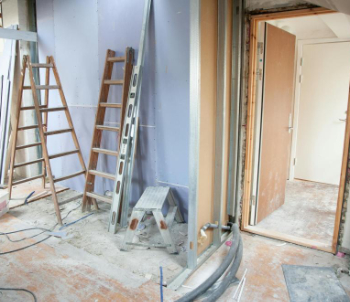Security for expenses under the Party Wall Act
The meaning of ‘Security for Expenses’ under section 12 of the Party Wall etc. Act 1996, the rights of both an owner and adjoining property owner and, any impact it may have on the costs associated with the works.
[edit] Introduction
Security for expenses is a specified sum of money that is placed in a secure account to cover any future damage and/or expenses that may arise from the proposed building works to be carried out by a building or adjoining owner of the property.
Under section 12(1) of the Act, an adjoining owner is entitled to serve a notice that would require the building owner carrying out the works to give security of a sum that may be agreed between the parties, failing which, under section 10 of the Act, a sum may be determined by the appointed party wall surveyor(s).
Under section 12(2) of the Act, the building owner is also entitled to request security from the adjoining owner where the adjoining owner requires the building owner to carry out works the costs of which lay with the adjoining owner, or, where the adjoining owner has served a notice under section 12(1) above. Again, if either or both of the owner’s failure to agree a sum, the appointed surveyor(s) may determine one.
Under section 12(3) if an adjoining owner fails to comply within 1 month of service or determination of section 12(2)notice, any security notice that the adjoining owner had served on the building owner under section 12(1) will cease to have an effect.
[edit] What does ‘security for expenses’ actually cover?
Until 2011, the common practice was to ensure that enough funds were in place to cover any structural risks and/or damage to an adjoining owners property as a result of a building owner failing to complete the agreed works to the adjoining owner's property.
As stated on page 106 of the Party Wall Explained (2nd Edition) (The Green Book): “Security can only be requested if the building owner intends to exercise rights “conferred by this Act”, i.e. he is proposing to carry out some work to the adjoining owner’s land or property. If he is simply excavating his own land then the adjoining owner has no right to receive security under this section.”
However, in the case of Kaye v Lawrence, the extent to which security may be required was determined by the court to include any works carried out on the building owner’s property that are covered in the Act, thereby overriding the traditional practices used by the surveyor’s following the guidelines in The Green Book. The decision further states that all and/or any liability for loss or damage arising from works carried out under rights conferred to an owner by the Act.
In layman’s terms, this means that any costs associated with the works being carried under the rights conferred by the Act are recoverable. This might include costs that are reasonably incurred making good any damage caused, temporary accommodation costs, professional fees, damages and court fees.
Security for expenses usually arises when works including, basement excavations, underpinning or extensive structural works, increase the risk of structural damage.
The costs associated with security under section 12 can be substantial, usually ranging from £50,000 to £100,000. There have been many instances whereby, the burden of costs associated with the security expenses has prevented a building owner from commencing the construction works. Those who are able to place security funds on account or provide indemnity insurance cover for security might have to part with significant sums of money prior to any works commencing, thus adding further unexpected costs to the works being carried out.
Either way, security for expenses is a complex matter that should be considered by your appointed Party Wall Surveyor who will scrutinise the sums being requested and determine whether the sums are fair and reasonable before being agreed within a Party Wall Award.
If you or your adjoining neighbour is planning to undertake any building works that you have reason to believe may incur security expenses, contact an experienced party wall surveyor to discuss, in the first instance, the site-specific facts that may require such protections to be taken into account.
[edit] Related articles on Designing Buildings
- 10(4) Party Wall Surveyor Appointments.
- Adjoining buildings definition.
- Adjoining owner.
- Construction covered by the Party Wall Act of 1996.
- Institute of party wall surveyors.
- Party structure notice.
- Party wall act.
- Party wall notice.
- Party wall surveyor.
- Responsibility for boundary features.
- Right of entry.
- Right of support.
- Right to access land.
- Three party wall notice responses.
- What approvals are needed before construction begins.
- Who Pays for Party Wall Surveyor's Fees?
Featured articles and news
Considerate Constructors Scheme acquires Building A Safer Future
Acquisition defines a new era for safety in construction.
AT Awards evening 2024; the winners and finalists
Recognising professionals with outstanding achievements.
Reactions to the Autumn Budget announcement
And key elements of the quoted budget to rebuild Britain.
Chancellor of the Exchequer delivers Budget
Repairing, fixing, rebuilding, protecting and strengthening.
Expectation management in building design
Interest, management, occupant satisfaction and the performance gap.
Connecting conservation research and practice with IHBC
State of the art heritage research & practice and guidance.
Innovative Silica Safety Toolkit
Receives funding boost in memory of construction visionary.
Gentle density and the current context of planning changes
How should designers deliver it now as it appears in NPPF.
Sustainable Futures. Redefining Retrofit for Net Zero Living
More speakers confirmed for BSRIA Briefing 2024.
Making the most of urban land: Brownfield Passports
Policy paper in brief with industry responses welcomed.
The boundaries and networks of the Magonsæte.
London Build Fire and Security Expo
20-21 Nov and now with new Ambassador Programme..
The Scottish Building Safety Levy
Eight weeks of consultation closing on 18 November.
The grey, the brown and the golden rules of housing
shifting policies from the wild west of housing development.
Future proofing homes that are fit for purpose
Specification challenges and the role of plastic.
Thousands of new homes unlocked for brownfield sites
£68 million to 54 councils for neglected land into new homes.























